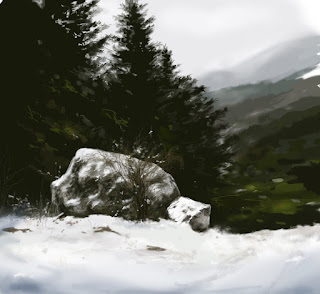Here is an example of how a simple rock study can become a more complete digital painting in about 2 hours. The color palette is very limited and subdued.
Initially my plan was to find out how quickly I could paint realistic organic textures and forms using the Lasso tool and Brushes in Photoshop CS5 and document how limitations of this method can be overcome. This is the plan I fallowed:
1. Find photo references that showed rock forms under overcast light. As you know overcast light allows to see greater tonal range and consequently to render a better description of the form.

2. Concentrate on large color masses to establish the abstract structure (Notan) of the painting.
3. Use the fewest lines possible and go directly to the lasso tool to isolate areas of similar tonal value and work with brushes on producing organic textures and airbrushed backgrounds.
Here how the painting session actually went. First I opened Photoshop CS3 and created a new 8x10" document at 72 dpi with white background. I traced with a dark brown brush the basic outlines of the rocks and proceeded to create selections with the lasso tool. Notice how the lasso selection leaves sharp edges. These can be controlled by refining the selection and using the Smodge tool. I used the same steps to create the tonal range in the gray sky that gradually blended into the mountains and valley in the right side of the painting.

Initially my plan was to find out how quickly I could paint realistic organic textures and forms using the Lasso tool and Brushes in Photoshop CS5 and document how limitations of this method can be overcome. This is the plan I fallowed:
1. Find photo references that showed rock forms under overcast light. As you know overcast light allows to see greater tonal range and consequently to render a better description of the form.

2. Concentrate on large color masses to establish the abstract structure (Notan) of the painting.
3. Use the fewest lines possible and go directly to the lasso tool to isolate areas of similar tonal value and work with brushes on producing organic textures and airbrushed backgrounds.
Here how the painting session actually went. First I opened Photoshop CS3 and created a new 8x10" document at 72 dpi with white background. I traced with a dark brown brush the basic outlines of the rocks and proceeded to create selections with the lasso tool. Notice how the lasso selection leaves sharp edges. These can be controlled by refining the selection and using the Smodge tool. I used the same steps to create the tonal range in the gray sky that gradually blended into the mountains and valley in the right side of the painting.
I think this method is surprisingly effective and fast. It allowed me to quickly determine if the basic color palette would work and also to make sure that the tonal values followed the rules of atmospheric perspective .

After working with the main masses in the tree and the valley on the right, I increased the resolution to 150dpi and cropped the file with Genuine Fractal PrintPro-the version 5 I have only works in CS3. This is an excellent tool to achieve both the final resolution and dimensions of your artwork. Then I opened the file in PS CS5 and continued to add details until I got the results you see here. Digital painting allows you to test different options and possibilities in a very short time. Try it!


